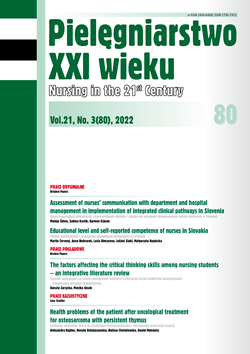Posttraumatic growth in children and adolescents with type 1 diabetes
DOI:
https://doi.org/10.2478/pielxxiw-2022-0024Keywords:
posttraumatic growth, child, diabetes mellitus, opingAbstract
POSTTRAUMATIC GROWTH IN CHILDREN AND ADOLESCENTS WITH TYPE 1 DIABETES
Aim. The study aimed to identify the presence of posttraumatic growth in children and adolescents with the diabetes mellitus type I and to fi nd out relations with coping strategies.
Material and methods. The research group was formed by 102 children aged 12-18 years with diabetes mellitus type I. The research design was a cross-sectional study. The Posttraumatic Growth Inventory for Children (PTGI-C) and the Ways of Coping Questionnaire (WCQ) were used for data collection.
Results. The ways of coping with stress are related to the subsequent posttraumatic growth in children and adolescents with type 1 diabetes. The strongest correlation was found between posttraumatic growth and coping strategies Seeking Social Support and Planful Problem-Solving. The correlation between posttraumatic growth and coping strategy Escape-Avoidance has not been identifi ed. However, this strategy was most often used by adolescents. There was no diff erence in the level of posttraumatic growth with respekt to sex of the respondents and their age, except for the area of Personal Strength and area of Spiritual Change.
Conclusions. The facilitation of eff ective coping strategies by a nurse can have a positive eff ect on the posttraumatic growth o children and adolescents with diabetes.
References
1. Tedeschi RG, Shakespeare-Finch J, Taku K, et al. Posttraumatic growth: theory, research, and applications. New York: Routledge; 2018.
2. Berger R. Stress, trauma, and posttraumatic growth: social context, environment, and identitles. New York: Routledge; 2015.
3. Joseph S. Co nás nezabije...: možnosti posttraumatického růstu. Praha: Portál; 2017.
4. Paulík K. Psychologie lidské odolnosti. Praha: Grada; 2017.
5. Kučerová E. Jaspersův koncept mezních situací a Franklův smysl v utrpení – pozitivní pohledy na náročnou životní událost. Psychoterapie. 2015; 9 (1): 21-29.
6. Šumník Z, Brož J. Úskalí přechodu dětských pacientů s diabetem mezi dospělé [in:] Kvapil M. Diabetologie. Praha: Triton; 2015, s. 253-257.
7. Cherubini V, Skrami E, Iannilli A, et al. Disordered eating behaviors in adolescents with type 1 diabetes: A cross-sectional population-based study in Italy. Internat J Eat Disord. 2018; 51 (8): 890-898.
8. Bernstein CM, Stockwell MS, Gallagher MP, et al. Mental health issues in adolescents and young adults with type 1 diabetes: prevalence and impact on glycemic control. Clin Pediatr. 2013; 52 (1): 10-15.
9. Tran V, Wiebe DJ, Fortenberry KT, et al. Benefit finding, affective reactions to diabetes stress, and diabetes management among early adolescents. Health Psychol. 2011; 30 (2): 212-219.
10. Al-Yateem N, Subu MA, Al-Shujairi A, et al. Coping among adolescents with long-term health conditions: a mixed-methods study. Br J Nurs. 2020; 29 (13): 762-769.
11. Klimer RP, Gil-Rivas V, Tedeschi RG, et al. Use of revised posttraumatic growth inventory for children. J Trauma Stress. 2009; 22 (3): 248-253.
12. Edwards JR, O´Neill RM. The construct validity of scores on the ways of coping questionnaire: confirmatory analysis of alternative factor structures. Educ Psychol Meas. 1998; 58 (6): 955-983.
13. Meyerson, DA, Grant KE, Carter JS, et al. Posttraumatic growth among children and adolescent: A systematic review. Clin Psychol Rev. 2011; 2011 (31): 946-964.
14. Rassart J, Luckx K, Berg CA, et al. Longitudinal trajectories of benefit finding in adolescents with type 1 diabetes. Health Psychol. 2017; 36 (10): 977-986.
15. Taku K, McDiarmid L. Personally important posttraumatic growth in adolescents: The effect on self-esteem beyond commonly defined posttraumatic growth. J Adolesc. 2015; 44: 224-231.
16. Grey M. Coping skills training for youths with diabetes. Diabetes Spectr. 2011; 24 (2): 70-75.
17. Pisula E, Czaplinska Z. Coping with stress in adolescents with type 1 diabetes and their mothers. Eur J Med Res. 2010; 15(Suppl. II): 1-5.
18. Medveďová L. Zdroj stresu a zdroje jeho zvládania deťmi a adolescentmi. Psychológia a patopsychológia dieťata. 2004; 39 (2-3): 108-120.
19. Zeligman M, Varney M, Grad R, et al. Posttraumatic growth in individuals with chronic illness: the role of social support and meaning making. J Couns Dev. 2018; 96 (1): 53-63.
20. Prati G, Pietrantoni L. Optimism, social support, and coping strategies as factors contributing to posttraumatic growth: a meta-analysis. J Loss Prev Process Ind. 2009; 14 (5): 364-388.
Downloads
Published
Issue
Section
License
Copyright (c) 2022 Authors

This work is licensed under a Creative Commons Attribution 4.0 International License.




